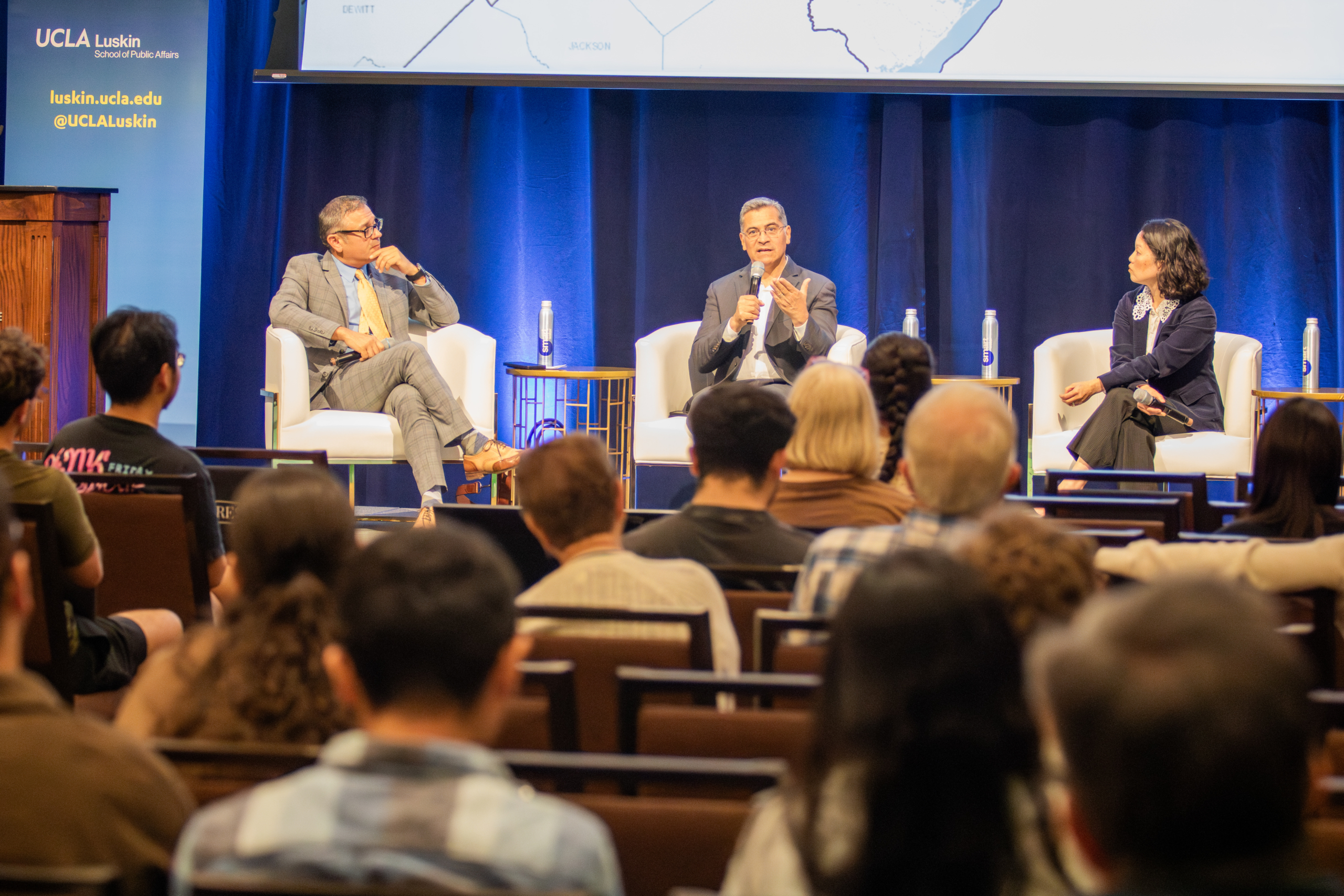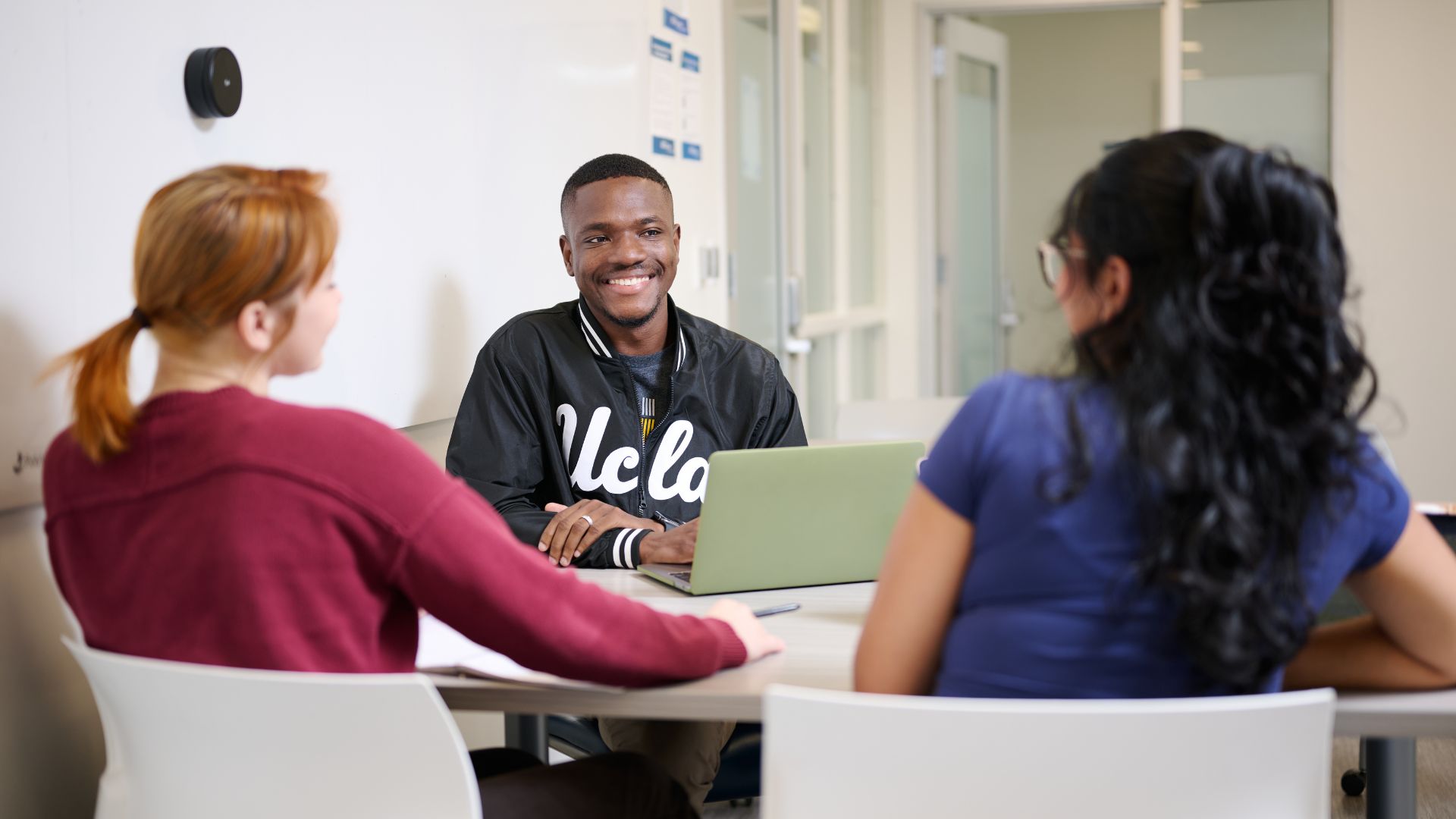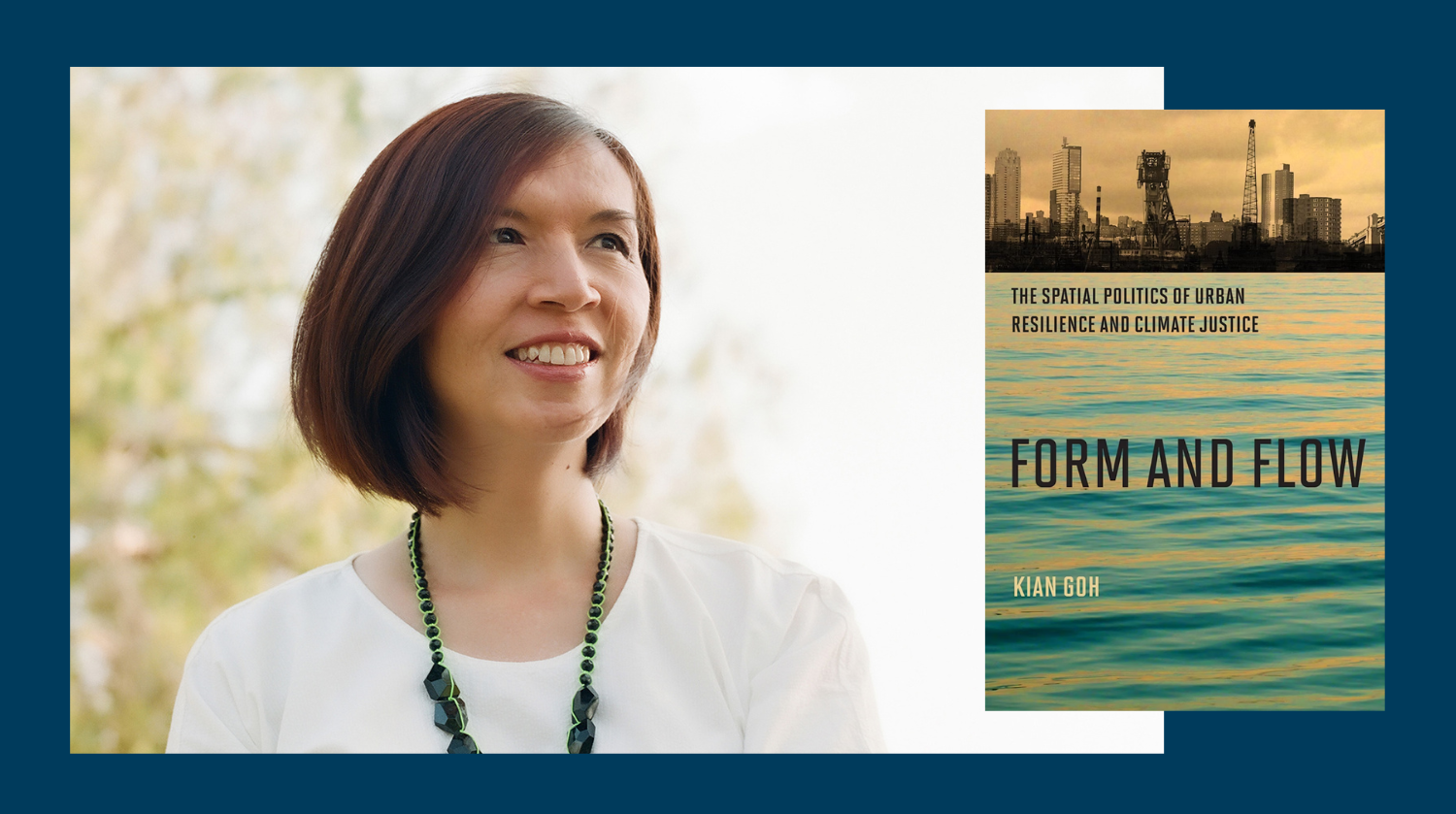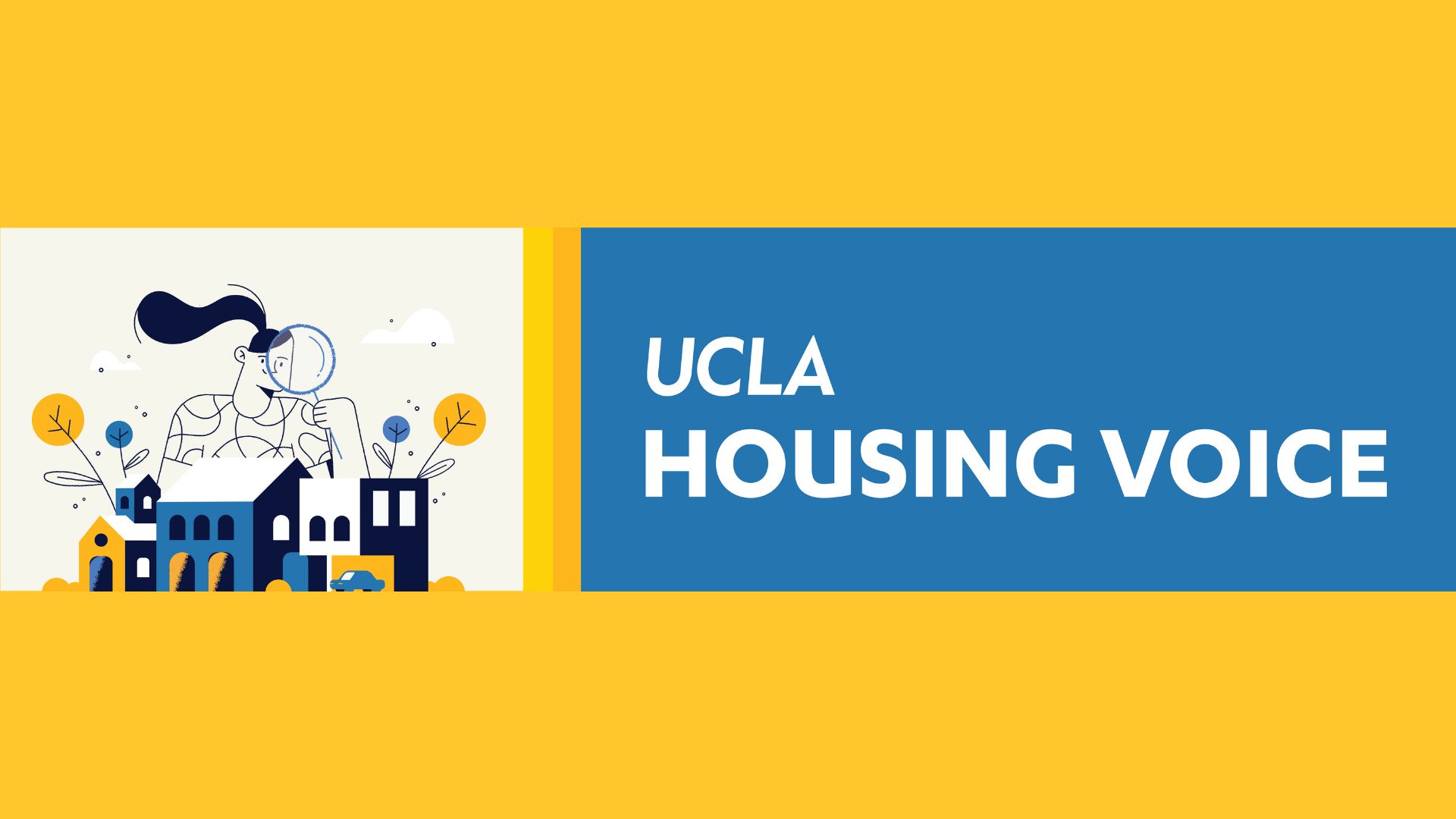Protecting Democracy and the 2025 Redistricting Battles: A Conversation with Xavier Becerra Xavier Becerra and UCLA scholars warn that the fight for fair representation is far from over.
As our country prepares for another election cycle, questions about representation and the integrity of American democracy continue to dominate public discourse. On October 28, the UCLA Luskin School of Public Affairs hosted “Protecting Democracy and the 2025 Redistricting Battles,” a Luskin Lecture co-sponsored by the UCLA Voting Rights Project. The event featured former California Attorney General and U.S. Secretary of Health and Human Services Xavier Becerra, who delivered a keynote address on the challenges and opportunities in protecting democracy ahead of the next round of redistricting.
Becerra was joined by Chad Dunn, director of litigation for the UCLA Voting Rights Project and a lead litigator in the ongoing Texas redistricting lawsuit, and Dr. Natalie Masuoka, professor of Political Science and Asian American Studies at UCLA and an expert on voting behavior and minority representation. The discussion was moderated by Dr. Matt Barreto, professor of Political Science and Chicana/o Studies and faculty director of the UCLA Voting Rights Project.
Drawing from his decades of public service at the state and federal level, Becerra underscored the fragility of democratic systems when power is unchecked. “As we’ve seen over the last 10 months, the federal government has a ton of power, and wields it in ways that exceed what the Constitution intends,” he said. “There are limits to federal power, but if you have someone who decides to exceed the scope of that power, you can see how damaging it can be for the states.”
Throughout the evening, panelists emphasized the critical importance of ensuring that voters retain control over the redistricting process. Becerra contrasted California’s citizen-led commission process with state-controlled redistricting systems in Texas and Florida. “In California, voters have a say. In Texas, the people living in those voting districts have no say in how the maps are drawn,” he said.
The conversation explored the upcoming Proposition 50 vote in California, which would temporarily establish new district boundaries based on the latest population data. Becerra and his fellow panelists examined how the proposal could affect representation, particularly for communities of color.
Dunn, who has spent years challenging partisan gerrymandering, framed the issue as a fundamental question of voter rights. “I believe the right to vote is individual, not aggregate,” he said. “If someone is being gerrymandered on the basis of their political views, that is a violation of their right to vote, full stop. And there ought to be a redress for it in court.”
He went on to note that the composition of Congress does not currently reflect the nation’s diversity. “This action to silence voters on the basis of their race and political views will be successful to some degree,” Dunn said. “What California does to press back on it isn’t just fighting fire with fire—it’s ensuring that Congress is as representative as it can be of this nation as a whole.”
Dr. Masuoka emphasized the dual nature of redistricting: while it can be used to suppress certain communities, it can also be a tool for empowerment. “Redistricting can discriminate and marginalize voices of color, but the reason we passed the 1965 Voting Rights Act is that redistricting can also increase minority voting power,” she said. “As we look forward to voting on Prop 50, we can protect democracy and ensure that we have protections for voters of color.”
Becerra urged the students in the audience to remain vigilant and engaged. “The most powerful weapon we have is truth—and the willingness to use our voices and our cameras to protect it.”
From Liberia to Luskin: A Public Policy Student’s Journey of Purpose and Impact Prince L. Jarbo, MPP ’26, is using his Air Force experience and UCLA education to drive change in his home country.
by Peaches Chung
Prince Larmie Jarbo, MPP ’26, brings a global perspective to his studies at the UCLA Luskin School of Public Affairs. Shaped by his upbringing in Liberia, his faith, and his service in the U.S. Air Force, he’s determined to use public policy to create lasting change in his home country.
Jarbo first came to the United States at age 12 but returned to Liberia at 14. “When I came back to the U.S. again at 18, I joined the Air Force,” he recalls. Determined to pursue a debt-free education, he served while completing his bachelor’s degree online. His military experience — and his life across two continents — instilled in him resilience, adaptability, and a profound sense of duty.
That same sense of service guides his work today as the founder of Project Change, a youth-led nonprofit dedicated to cultivating the next generation of changemakers in Liberia.
 “Project Change inspires young Liberians to take ownership of their future,” he explains. “Through personal and professional development, we’re helping them move from dependency to possibility — giving them the mindset and tools to lead. And we instill in them a responsibility not only for themselves but also for helping rebuild our country.”
“Project Change inspires young Liberians to take ownership of their future,” he explains. “Through personal and professional development, we’re helping them move from dependency to possibility — giving them the mindset and tools to lead. And we instill in them a responsibility not only for themselves but also for helping rebuild our country.”
Liberia, a West African nation that endured two devastating civil wars between 1989 and 2003, continues to rebuild from years of conflict and economic instability. Growing up amid the aftermath shaped Jarbo’s belief that lasting change requires both effective policy and governance and empowered citizens.
“Liberia has suffered a lot as a post-conflict nation,” Jarbo explains. “I feel a sense of responsibility to help bring about change. Everything I’ve learned outside my country, I’m bringing back to improve it.”
Jarbo is already applying what he’s learning at UCLA as chairman of Project Change and as co-president of the Public Policy Leadership Association (PPLA), a student group that fosters an inclusive and equitable learning environment for his peers while advocating for their interests across campus. In the classroom, his coursework has broadened his understanding of stakeholder engagement, data-driven decision-making, and long-term economic strategy. “I feel a sense of responsibility to help bring about change. Everything I’ve learned outside my country, I’m bringing back to improve it.”
“The program doesn’t just teach theory,” he says. “It helps you design real solutions and put them into practice.”
His time at Luskin has not only equipped him with the tools to lead change — it has reaffirmed something deeper — the “why” behind his work. For Jarbo, faith remains the foundation that ties it all together. “Faith gives me clarity about why I’m here and what I’m called to do,” he reflects. “It’s what connects my service, my studies, and my vision for Liberia’s future.”
As he looks ahead to graduation in 2026, Jarbo is preparing to return to Liberia with renewed purpose. “My time at UCLA has given me more than an education,” he says. “It’s given me direction, a network, and the confidence to go back and make a difference.”
For Jarbo, that difference begins with one simple idea: empowering others to believe that change is possible.
Book by Kian Goh Honored by Association of Collegiate Schools of Planning
UCLA Luskin’s Kian Goh has been awarded the 2025 Paul Davidoff Book Award from the Association of Collegiate Schools of Planning (ACSP).
Goh’s book “Form and Flow: The Spatial Politics of Urban Resilience and Climate Justice,” published in 2021 by MIT Press, explores the politics of urban climate change responses in different cities — New York City; Jakarta, Indonesia; and Rotterdam, Netherlands — as well as the emergence of grassroots activism in resistance.
“The study brings both ethnographic depth and impressive critical theory to one of the most important issues of our moment,” the ACSP Award Committee said, praising Goh for skillfully drawing a throughline across disparate geographies in a way that does not feel contrived.
Goh is an associate professor of urban planning at UCLA Luskin and associate faculty director of the UCLA Luskin Institute on Inequality and Democracy. Her research focuses on urban ecological design, spatial politics, and social mobilization in the context of climate change and global urbanization.
The Paul Davidoff Book Award recognizes an outstanding book publication regarding participatory planning and positive social change, including opposing poverty and racism and addressing social and place-based inequalities. The award honors the memory of Paul Davidoff, who established the field of advocacy planning and worked toward social equity in the profession.

UCLA, Community Partners Help Fire Recovery Through Free Soil Testing
In an effort to support the region’s recovery in the aftermath of the 2025 Los Angeles County wildfires, a team of UCLA researchers is joining with community partners to test soil samples from neighborhoods hit hard by the blazes.
The fires in the Pacific Palisades-Malibu area and the Altadena-Pasadena communities claimed at least 31 lives and damaged or destroyed more than 18,000 structures, according to county officials.
It also left many residents wondering what was in their soil.
“Soil screening is a necessary first step, but it’s not a solution,” said Kirsten Schwarz, an associate professor of environmental health sciences and urban planning with joint appointments at the UCLA Fielding School of Public Health and UCLA Luskin School of Public Affairs.
“Fire-impacted communities are eager for actionable solutions and soil amendments, like compost and mulch — low-cost, accessible options that help us manage risk,” she said.
Schwarz and Jennifer Jay, a professor of civil and environmental engineering at the UCLA Samueli School of Engineering, co-lead the LA Urban Soil Social Impact Collaborative, which is hosting pop-up soil testing events, workshops and remediation projects across the region.
At an Oct. 4 event at the Washington Park Community Center in Pasadena, the collaborative welcomed more than 80 residents and screened more than 200 soil samples using portable X-ray fluorescence analyzers to detect heavy metals, including lead, a known cause of significant illness. Participants were able to have up to three soil samples screened and received personalized consultations on how to improve soil health and safety in their yards and gardens.
The collaborative, which includes UCLA researchers and community-based, tribal, private, and academic partners from across Los Angeles, is funded by UCLA’s Center for Community Engagement. The group aims to leverage university research and resources and apply local and Indigenous knowledge to advance equitable access to healthy soils.
UCLA Report Finds Latino Arrests by ICE Have Skyrocketed Under the Trump Administration’s Second Term
A new analysis conducted by the UCLA Luskin School of Public Affairs’ Center for Neighborhood Knowledge (CNK) reveals a sharp escalation in immigration enforcement for the first six months of President Trump’s second administration, targeting Latino communities at unprecedented levels. The report was produced in partnership with Unseen, a new initiative dedicated to illuminating the contributions and challenges of unseen Americans through data analysis and community engagement.
The analysis finds that Latinos accounted for nine out of ten Immigration and Customs Enforcement (ICE) arrests during the first six months of 2025. Arrests nearly doubled during Trump’s first 100 days in office and rose even further after senior advisor Stephen Miller announced a daily target of 3,000 arrests. The dataset used in the report comes from UC Berkeley School of Law’s Deportation Data Project.
“The data reveal a clear and troubling pattern,” said Paul Ong, Director of CNK. “Arrests in Latino communities have increased sharply without any evidence linking many of these arrests to higher crime levels. This indicates that ICE operations during Trump’s second term are largely driven by political and demographic targeting rather than just targeting the ‘worst of the worst’.”
Key findings include:
- Trump’s first hundred days had an average of 558 Latino arrests per day compared with 276 during the pre-Trump period (January 1, 2024 to January 19, 2025). Arrests were heavily concentrated among individuals from Mexico, Guatemala, Honduras and Venezuela, which experienced the most dramatic increase, with a 361% rise in arrests.
- Community-based enforcement surged under Trump, growing by 255%, a departure from previous administrations, which focused on deporting incarcerated individuals at the federal, state, and local levels.
- Enforcement increases were greatest in Texas, Florida, California, Georgia and Virginia
“This research reveals a clear shift toward more expansive, militarized and punitive immigration enforcement.” said Sonja Diaz, Founding Director of the Unseen Initiative. “The preponderance of community-based arrests under the Trump Administration combined with the doubling and even tripling of arrests of people of Mexican, Honduran, and Guatemalan descent undermines public trust in law enforcement and jeopardizes public safety for communities across the U.S., not just immigrant enclaves. ”
The complete report, including methodology, is available here.
About the UCLA Center for Neighborhood Knowledge The UCLA Center for Neighborhood Knowledge conducts rigorous research on urban inequality, housing, immigration, and demographic change to inform policy and promote social justice.
About Unseen Unseen is a research and advocacy initiative dedicated to making visible the contributions and challenges of Americans hidden in plain sight through data-driven analysis and community engagement.
UCLA Analysis Finds Altadena Faces Uneven Wildfire Recovery
Nine months after the Eaton Fire destroyed thousands of homes in Altadena, a new factsheet by UCLA Luskin researchers highlights deep racial and ethnic disparities in how homeowners are recovering.
The analysis from UCLA’s Latino Policy and Politics Institute and Center for Neighborhood Knowledge shows that while only a small number of families have sold or listed their homes, nearly 7 in 10 severely fire-damaged homes show no progress toward rebuilding. In addition, investors have purchased two-thirds of the homes that have changed hands, raising concerns about displacement and affordability.
The factsheet also shows that nearly six in ten Black-owned homes suffered severe damage — the highest rate of any group. Yet roughly 70% of all severely damaged homes show no visible steps toward recovery, with Black (73%) and Asian (71%) homeowners slightly more likely to remain stalled.
At the same time, Latino homeowners have filed rebuilding permits at the highest rate (30%), an early sign that some families are trying to move forward despite widespread underinsurance, soaring construction costs and complex permitting requirements.
“Altadena already had infrastructure limitations before the fire, and many families are now taking a wait-and-see approach: Many are waiting to see if their neighbors rebuild, some want to know if local businesses and services will return, and most are stuck figuring out how to pay for rebuilding because of financial barriers like underinsurance, little to no government support or the high cost of construction,” said Lori Gay, president and CEO at Neighborhood Housing Services of Los Angeles County.
Read the factsheet and full article.
UCLA Housing Voice Podcast Celebrates 100 Episodes Hosted by Shane Phillips, the podcast continues to bridge the gap between academic research and real-world housing solutions.
The UCLA Housing Voice Podcast, produced by the Randall Lewis Housing Initiative at the UCLA Lewis Center for Regional Policy Studies, will release its 100th episode on October 22. The podcast, a biweekly program managed by Shane Phillips and joined by UCLA Luskin professors Michael Lens, Paavo Monkkonen, and Mike Manville as occasional co-hosts, aims to translate emerging housing research into practical insights for practitioners, policymakers, and the broader public.
Each episode features conversations with housing researchers on topics such as affordability, displacement, land-use policy, and tenant protections. The Randall Lewis Housing Initiative supports this work by producing research and public programming to shape public discourse.
As a recent review from HousingForward Virginia put it, “What makes this podcast particularly valuable is how Phillips and his co-hosts translate academic jargon into practical insights. They don’t just present findings—they dig into what the research means for practitioners, policymakers, and communities.”
Since its debut, the podcast has explored a wide range of topics, from California’s Senate Bill 9 duplex law and inclusionary zoning policies to comparative housing laws in countries such as Japan and New Zealand. Across its first 99 episodes, the series has traced the evolving global conversation on housing equity and policy innovation.
The 100th episode will be available October 22 on all major podcast platforms.







